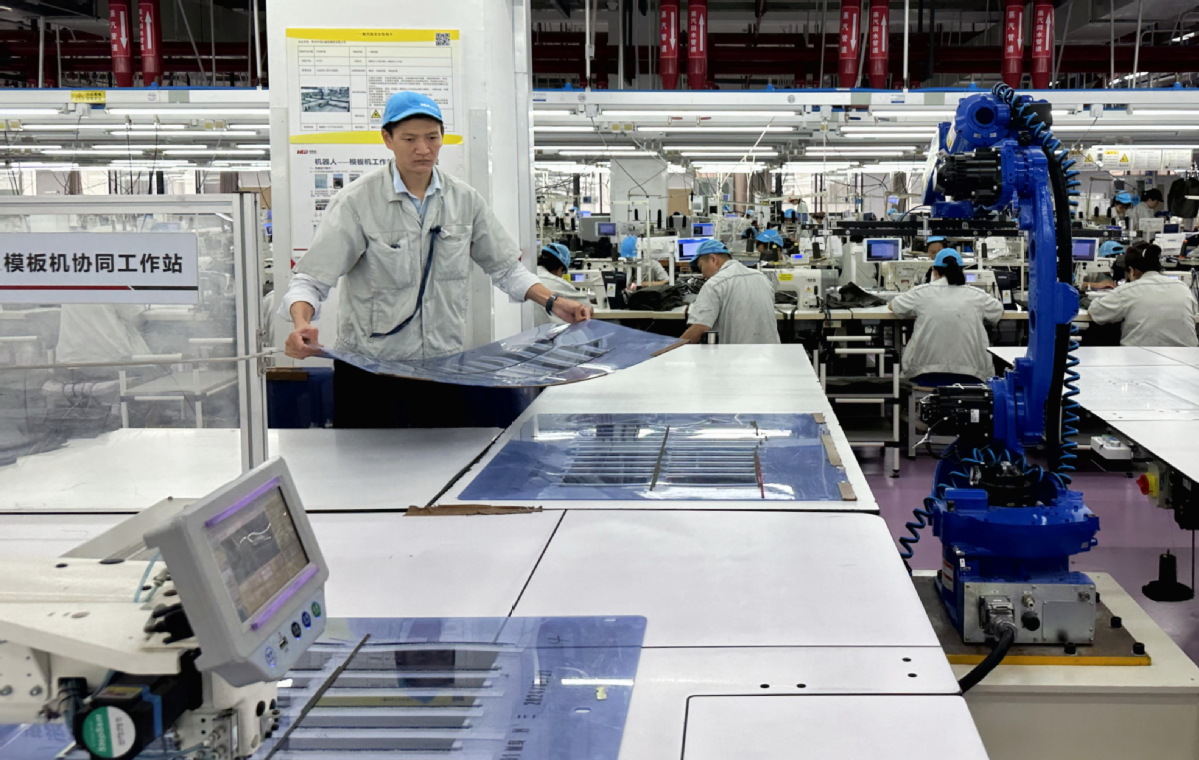
Two officials from Chengdu Customs inspect an export-bound vehicle to be transported via the China-Europe freight train service in Chengdu, Sichuan province, in October. [Photo/China Daily]
At a workshop of Ningbo Kaifeng Electric Appliance Co Ltd, rows of intelligent power connectors move smoothly along an assembly line.
The export value of these intelligent power connectors, which have wireless fast charging functionality on the side and USB interfaces on top, had already exceeded 20 million yuan ($2.76 million) in the first 10 months of this year.
The power connection products manufacturer, based in Ningbo, East China's Zhejiang province, has developed and launched several intelligent sockets with wireless fast charging features, which are now popular in various countries and regions.
"The demand for intelligent charging products has notably surged this year," said Shen Fengguang, manager of the company's exports unit. "In response, we developed a series of products at different price points to sell to more countries."
From January to October, the total export value of Ningbo Kaifeng's products reached 380 million yuan, marking a 22.7 percent growth year-on-year.
The growing exports reflect a broader trend in China's overall export landscape, where innovative and tech-driven products are increasingly meeting global demand.
Chinese exporters like Ningbo Kaifeng are leveraging innovation, competitive pricing and tailored solutions to expand their presence in both established as well as emerging markets.
To stay competitive and address risks from geopolitical tensions, Chinese exporters have been deepening their engagement in emerging markets, using cross-border e-commerce platforms, investing in green technologies and establishing overseas factories, said Cui Fan, a professor specializing in international trade at the Beijing-based University of International Business and Economics.
Their products, including electric vehicles exported to Brazil and Saudi Arabia, high-end medical equipment shipped to Egypt, Thailand and South Africa, and household appliances sold in Australia, the United States and Europe, are gaining global recognition.
In the first 10 months, China's foreign trade rose 5.2 percent from a year ago to 36.02 trillion yuan, with exports up 6.7 percent and imports up 3.2 percent, said the General Administration of Customs.
Highlighting the country's ongoing industrial upgrade, policy support and popularity of tech-intensive green products, Lyu Daliang, director-general of the administration's department of statistics and analysis, said that China is capable of achieving its full-year foreign trade goal of improved quality and stable growth volumes.

Employees at work in a textile factory in Changzhou, Jiangsu province, in July. [ZHONG NAN/CHINA DAILY]
Global market demand has increased this year.
In the second half of the year, concerns over potential tariff increases by the United States prompted some importers to stockpile goods, further driving up overseas demand and boosting exports, said Zhou Mi, a researcher at the Chinese Academy of International Trade and Economic Cooperation.
At the same time, China's domestic production has shown stable growth, partly due to increased financial support for manufacturing, said Zhou.
"As a result, the dual drivers of domestic production expansion and international demand growth have led to generally optimistic forecasts for this year's export growth," he added.
China has introduced a series of policies to boost its foreign trade. The government unveiled a slew of policy measures on Nov 21 to promote the steady growth of foreign trade and consolidate economic recovery.
For instance, the country will drive innovative development in green and border trade, attract and facilitate cross-border business travel, enhance maritime transport support for foreign trade, and strengthen employment services for foreign trade enterprises, according to the new policy measure, as outlined in information released by the Ministry of Commerce.
This move shows China's continued commitment to fostering new competitive strengths in the global market and advancing mutually beneficial cooperation with other countries, said Chen Bin, deputy director of the expert committee at the Beijing-based China Machinery Industry Federation.
As Chinese manufacturers produce a vast array of machinery and electrical equipment suitable for various industries, from construction to manufacturing, demand has surged from many developing nations for importing machinery and electrical products from China to drive their urbanization and industrialization, he said.
Southwest China's Sichuan province — a vital hub for high-value manufacturing and exports in western China — exemplifies this growth. Its export of machinery and electrical products, like electric vehicles and aerospace equipment, grew 6.6 percent on a yearly basis to 368.67 billion yuan during the January-October period, accounting for 75.3 percent of the province's total exports, data from Chengdu Customs showed.
One notable example is Sichuan Honghua Petroleum Equipment Co Ltd, a Deyang-based oil drilling equipment manufacturer.
"Since the beginning of this year, we have successively exported multiple sets of complete equipment, with a total import and export value exceeding 1.3 billion yuan, representing a year-on-year growth of over 20 percent," said Lyu Dong, head of the company's foreign trade unit.
Guangzhou Sameway Electric Bicycle Co Ltd, an electric bicycle manufacturer in Guangzhou, South China's Guangdong province, with 80,000 units in annual production capacity, exported lithium battery mountain bikes and other products worth nearly 45 million yuan in the first three quarters.
The company unveiled its latest long-range electric mountain bike at the 136th China Import and Export Fair, commonly known as the Canton Fair, in Guangzhou that concluded in early November.
Guangzhou Sameway's electric bicycles are powered by motors and lithium batteries, providing riding assistance. They are faster than regular bicycles and lighter than traditional electric bikes.
"Cycling is a popular sport in Europe and the US, but many cycling routes feature numerous slopes," said Chen Junjun, the company's head for Customs affairs.
"To help more people have fun while cycling, we have conducted extensive research into overseas markets and developed products such as lithium battery mountain bikes, which have been well-received by foreign consumers," said Chen.
To cultivate new growth points, the Chinese bicycle maker is actively expanding its cross-border e-commerce operations and has established a presence in multiple overseas warehouses for cross-border exports located in countries such as the US, Canada, Poland, and Germany. The total value of goods stocked in these facilities exceeds 80 million yuan.
Mechanical and electrical products dominated China's exports between January and October accounting for nearly 60 percent of the total, according to Customs data.
Specifically, exports of automatic data processing equipment and components rose 10.9 percent year-on-year during this period, integrated circuits were up 21.4 percent, while automobiles climbed 20 percent.
The ambitious carbon neutrality goals set by many countries have fueled demand for tech-intensive green products from China, including electric vehicles, solar panels, wind turbines, dual-power trains and energy-efficient appliances, said Chen Zongwang, deputy director-general of the GAC's department of general operation.
In addition to new growth points generated by the tangible growth of the Belt and Road Initiative, free trade agreements like the Regional Comprehensive Economic Partnership will continue to facilitate China's exports of green products and technologies across Asia and beyond, said Chen.
Foreign companies also share the same view.
Milliken & Co, a US specialty chemical and performance materials company, believes that China's complete industrial system, massive market scale and abundant human resources will continue to create export opportunities for multinational corporations in the country.
"Apart from supplying textile materials and chemicals to domestic customers, we also export to markets like South Korea, Singapore, Vietnam and India from our plants in Shanghai and Zhangjiagang, Jiangsu province," said Ed Zhao, the group's senior vice-president and managing director for Asia.
Exports of foreign-invested businesses in China amounted to 5.77 trillion yuan from January to October, marking a year-on-year growth of 1.9 percent, according to data from the GAC.